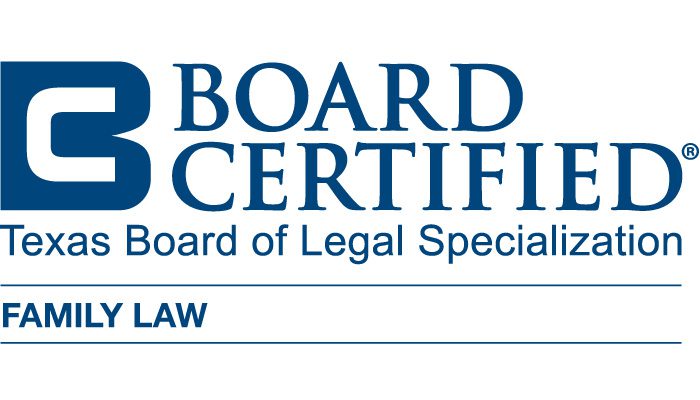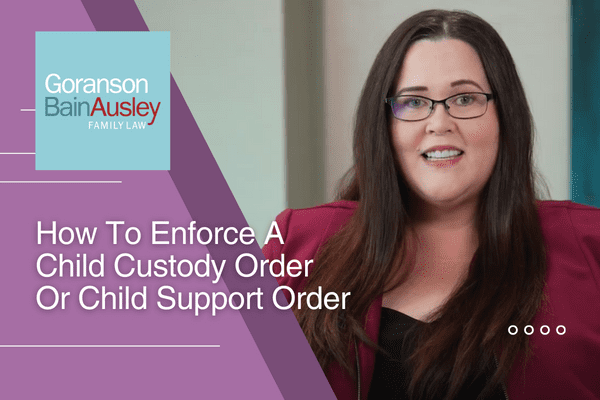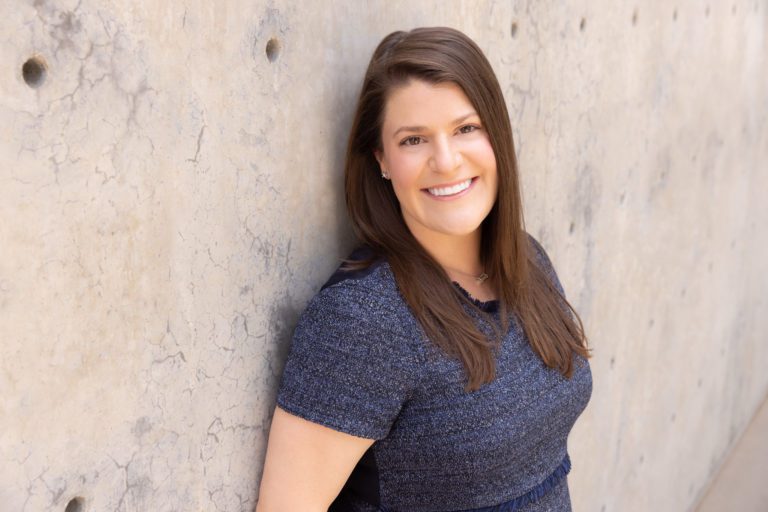Child Support Attorney in Texas

Meeting Your Children’s Financial Needs
One of the most critical responsibilities during divorce proceedings is ensuring children’s financial stability. Determining child support obligations is a major step, and while the Texas Family Code provides standard formulas for calculating payments, these guidelines don’t always reflect the complexities of every family’s financial situation.
At Goranson Bain Ausley, our experienced child support lawyer team recognizes that every family’s needs are unique. Serving clients in Dallas, Fort Worth, Granbury, Plano, Midland, Austin, and San Antonio, we work with you to determine whether to follow traditional child support guidelines or create a customized strategy that serves your child’s best interests. Trust a child support attorney in Texas from our firm to help secure the right outcome for you and your children.
Texas Child Support Guidelines
Child support is money paid to support a child, including providing the child with food, clothing, shelter, medical care, dental care, and education. The goal of child support is to ensure that the child is receiving the financial support necessary to meet their needs of the child. Texas law requires both legal parents to financially support their children’s necessary expenses even after a divorce.
Our child support attorney Texas team understands that few issues are as emotionally charged as deciding how much financial support a non-custodial parent must provide. At Goranson Bain Ausley, our experienced child support lawyers are well-versed in Texas child support laws and will advocate strongly for an outcome that supports both you and your child.
While all parties involved can usually agree that it’s necessary and responsible to provide child support, disputes often arise concerning the payment amount. Disputes such as these are especially common for spouses with high incomes or significant estates. Our attorneys guide clients through these high-conflict situations with sound and strategic advice.
2026 Texas Child Support Calculator
Use this calculator to get an estimate for child support based on a single source of income. Actual child support amounts may vary and must be set or approved by the court.
Child Support Options
Temporary Child Support
Temporary orders provide immediate financial stability for children before a divorce is finalized. A temporary child support order helps reduce stress on children by maintaining their routine and standard of living. These agreements may be formalized in the final decree or amended prior to finalization if necessary.
Permanent Child Support
Permanent child support establishes long-term payment terms but can be modified as life circumstances change. If significant changes occur, such as income fluctuation or additional legal obligations, an experienced child support lawyer from Goranson Bain Ausley can help request a modification to protect your child’s financial future.
Child Support FAQs
How Does The Texas Family Code Determine Child Support?
Under Texas Family Code guidelines, child support:
- Is not required of stepparents and partners who aren’t legal parents, regardless of how long they’ve been part of a child’s life
- Is typically calculated based on the paying parent’s net resources
- Can be different than the standardized calculation if the court believes that it is in the best interest of the child
- Includes coverage for medical and dental care
- May apply even if parents are sharing equal possession time
- Applies even if the paying parent does not exercise possession of their child
- Remains in force until a child turns 18 or graduates from high school. In the case of a special needs or otherwise dependent child, child support obligations continue until amended by the court
- Is not altered by the remarriage of either parent
- Can only be changed by court order
Is it Possible to Deviate from Texas Child Support Guidelines?
Yes. The best interest of the child will always be the court’s main point of consideration when calculating a child support payment. To evaluate what amount would be best for the child, the court will examine all relevant factors and evidence, such as:
- Debts assumed by a parent
- Parents’ financial situations and their ability to pay
- Child care expenses incident to a job
- Negative or positive cash flow that affects either parent’s liquidity
- Special educational, health, or other issues that affect a child or a parent
- If a parent has physical custody or conservatorship of a different child
- Health insurance premiums, deductibles, and uninsured medical expenses
- Housing, motor vehicle, and other benefits supplied to a parent by a third party
- Child’s college education and post-secondary school expenses
- Travel expenses associated with possession of and access to the child
- Spousal support paid or received by a parent
- Other deductions from the income of a parent
- If a parent is intentionally under- or unemployed
- How much time the children spend in each parent’s care
- Child’s age and needs
- Any other reason consistent with the best interest of the child, taking into account the circumstances of the parents
Determining Child Support Payments
Child support is closely tied to child custody and visitation arrangements. Typically, non-custodial parents (obligors) pay child support to custodial parents, who already contribute by providing everyday care.
In Texas, child support agreements must be approved by a judge to be enforceable. Even amicable agreements must demonstrate they serve the child’s best interests. That’s why having a child support attorney Texas involved in your agreement is essential to ensure legal compliance and avoid future disputes
Enforcement of Child Support Orders
Every child deserves to receive the support they need, whether it be emotional or financial. If a parent isn’t adhering to their child support order, that negatively impacts their child’s life. Luckily, steps can be taken to resolve the issue.
Several state and federal agencies handle child support enforcement. In Texas, the Office of the Attorney General and family courts partner with the federal Office of Child Support Enforcement to locate and notify non-compliant parents of any court orders and the amounts of child support payments owed to the custodial parent.
Texas also has a diversion program called the Child Support Probation Unit. This unit collaborates with the Office of the Attorney General and the IV-D child support court associate judges to provide an incarceration alternative for non-custodial parents who have been held in contempt for non-payment of child support. County probation divisions monitor money due to custodial parents, attempt to remove barriers to child support payment by providing probationers with access to community resources, and can reduce jail stays for certain incarcerated parents by placing them in structured, court-monitored support programs instead of prison or jail.
Using a private experienced child support lawyer can expedite enforcement and prevent your case from getting delayed in the system.
Modifying Child Support Orders
As your life changes over time, the terms of your child support order may need to be modified. Specific circumstances must exist to do this, and it’s important that any modification be formalized through a new court order and not through an informal agreement. Informal agreements between parents are not enforceable and can result in legal difficulties for both parents.
Child support orders can be modified by either parent if the existing order has been active for more than three years or the monthly support amount would change by either 20% or $100. This often occurs when the obligor experiences a significant change in circumstances, such as the non-custodial parent’s income significantly increasing or decreasing, the non-custodial parent becoming legally responsible for more children, medical insurance for the dependent child/children changing, custodial arrangements being altered, a major medical issue arising, or the non-custodial parent being incarcerated.
It’s important to note that incarceration itself will not alter a child support order. The obligor must apply for a modification to the order to ensure that they are not held responsible for back payments.
Hire Our Experienced Texas Child Support Attorneys
The Dallas, Fort Worth, Granbury, Plano, Midland, Austin, and San Antonio child support attorneys at Goranson Bain Ausley are dedicated to identifying your child’s financial needs and protecting both your and your child’s interests. Whether you’re resolving initial child support terms or pursuing enforcement or modification, our experienced child support lawyers will guide you with skill and compassion.
Schedule a consultation with a child support attorney Texas expert from our team today.
Awards & Credentials
- Thomas P. Goranson 1997
- Thomas L. Ausley 1997
- Diana S. Friedman 1998
- Thomas A. Greenwald 2003
- Kathryn J. Murphy 2004
- Eric Robertson 2007
- Kelly Ausley-Flores 2009
- Cindy V. Tisdale 2010
- Kristal Thomson 2014
- Aimee Pingenot Key 2015
- Kristen A. Algert 2017
- P. Lindley Bain 2020
- Ryan R. Bauerle 2022
- Lindsey Obenhaus 2023
- Charla Davies 2024
- John J. Kappel 2024

- Angeline Lindley Bain 2015 2014 2013 2012 2011 2009 2008
- Hayley Collins Blair 2021 2018
- Kevin Davidson 2025
- Jeff Domen 2025
- Esther R. Donald 2025
- Diana S. Friedman 2017 2016 2015 2013
- Thomas P. Goranson 2011 2009 2008
- Thomas A. Greenwald 2022 2018 2012 2011 2009 2008
- Aimee Pingenot Key 2025 2024 2020 2019 2017
- Beth E. Maultsby 2010
- Kathryn J. Murphy 2024 2023 2020 2019 2018 2017 2010 2009 2008
- Lindsey Obenhaus 2025 2024 2023 2022 2021
- Katie Flowers Samler 2020 2019 2018


- Thomas L. Ausley 1980
- Gary L. Nickelson 1984
- Kathryn J. Murphy 1995
- Diana S. Friedman 1996
- Kristen A. Algert 1997
- Thomas A. Greenwald 1997
- Eric Robertson 1997
- Kelly Ausley-Flores 2000
- Curtis W. Harrison 2002
- Cindy V. Tisdale 2003
- Jeff Shore 2006
- Clint Westhoff 2006
- Jeff Domen 2009
- Kristal Thomson 2009
- Angel J. Berbarie 2010
- P. Lindley Bain 2012
- Aimee Pingenot Key 2012
- Kevin Davidson 2017
- Charla Davies 2017
- Rob Frazer 2018
- Ryan R. Bauerle 2018
- Hayley Collins Blair 2019
- Lindsey Obenhaus 2019
- Katie Flowers Samler 2019
- Jonathan James 2020
- John J. Kappel 2020
- Chris Nickelson 2021
- Chandler Rice Winslow 2023
- Kristiana Butler 2024
- Cassidy Pearson 2024
- Angelica Rolong Cormier 2024
- Mona Hosseiny Tovar 2026




























































